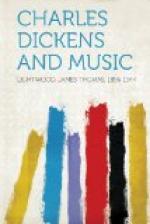The knives and forks form a pleasing accompaniment to Auber’s music, and Auber’s music would form a pleasing accompaniment to the dinner, if you could hear anything besides the cymbals.
He met Meyerbeer on one occasion at Lord John Russell’s. The musician congratulated him on his outspoken language on Sunday observance, a subject in which Dickens was deeply interested, and on which he advocated his views at length in the papers entitled Sunday under Three Heads.
Dickens was acquainted with Jenny Lind, and he gives the following amusing story in a letter to Douglas Jerrold, dated Paris, February 14, 1847:
I am somehow reminded of a good story I heard the other night from a man who was a witness of it and an actor in it. At a certain German town last autumn there was a tremendous furore about Jenny Lind, who, after driving the whole place mad, left it, on her travels, early one morning. The moment her carriage was outside the gates, a party of rampant students who had escorted it rushed back to the inn, demanded to be shown to her bedroom, swept like a whirlwind upstairs into the room indicated to them, tore up the sheets, and wore them in strips as decorations. An hour or two afterwards a bald old gentleman of amiable appearance, an Englishman, who was staying in the hotel, came to breakfast at the table d’hote, and was observed to be much disturbed in his mind, and to show great terror whenever a student came near him. At last he said, in a low voice, to some people who were near him at the table, ’You are English gentlemen, I observe. Most extraordinary people, these Germans. Students, as a body, raving mad, gentlemen!’ ‘Oh, no,’ said somebody else: ’excitable, but very good fellows, and very sensible.’ ‘By God, sir!’ returned the old gentleman, still more disturbed, ’then there’s something political in it, and I’m a marked man. I went out for a little walk this morning after shaving, and while I was gone’—he fell into a terrible perspiration as he told it—’they burst into my bedroom, tore up my sheets, and are now patrolling the town in all directions with bits of ’em in their button-holes.’ I needn’t wind up by adding that they had gone to the wrong chamber.
It was Dickens’ habit wherever he went on his Continental travels to avail himself of any opportunity of visiting the opera; and his criticisms, though brief, are always to the point. He tells us this interesting fact about Carrara:
There is a beautiful little theatre there, built of marble, and they had it illuminated that night in my honour. There was really a very fair opera, but it is curious that the chorus has been always, time out of mind, made up of labourers in the quarries, who don’t know a note of music, and sing entirely by ear.
But much as he loved music, Dickens could never bear the least sound or noise while he was studying or




